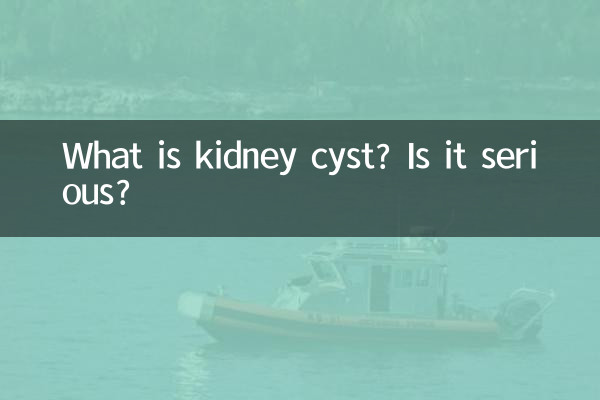What is kidney cyst? Is it serious?
In recent years, with the improvement of health awareness, kidney disease has gradually become one of the focuses of people's attention. Renal cysts, as a common renal lesion, have aroused widespread discussion. This article will combine the hot topics and hot content on the Internet in the past 10 days to provide you with a detailed analysis of the definition, classification, symptoms, severity and treatment methods of kidney cysts.
1. Definition and classification of renal cysts

Kidney cysts are fluid-filled sac-like structures that form within the kidneys. Depending on their nature and cause, kidney cysts can be divided into the following categories:
| type | Features | Incidence |
|---|---|---|
| simple renal cyst | Single or multiple cysts, thin cyst wall, clear liquid content | About 50% of people over 50 years old |
| polycystic kidney disease | Hereditary disease, multiple cysts in both kidneys | About 1/400-1/1000 |
| acquired renal cyst | Common among long-term dialysis patients | About 90% of patients have been on dialysis for more than 5 years |
2. Symptoms of renal cysts
Most patients with renal cysts have no obvious symptoms and are often discovered incidentally during physical examination. But when the cyst grows or complications develop, the following symptoms may occur:
| symptom | frequency of occurrence | Severity |
|---|---|---|
| lower back pain | About 30% of patients | mild to moderate |
| hematuria | About 15% of patients | May indicate complications |
| hypertension | About 20-30% of patients | Need drug control |
| urinary tract infection | About 10% of patients | May recur |
3. Assessment of the severity of renal cysts
Whether a kidney cyst is serious depends on a variety of factors:
1.Cyst size: Cysts less than 5cm in diameter usually do not require special treatment; cysts larger than 5cm may compress surrounding tissue.
2.number of cysts: Simple renal cysts usually have a good prognosis; polycystic kidney disease may lead to progressive deterioration of kidney function.
3.Whether there are complications: Situations such as infection, bleeding, rupture or malignant transformation will increase the severity of the condition.
4.Effects on kidney function: Most simple cysts do not affect kidney function; polycystic kidney disease may lead to end-stage renal disease.
4. Diagnostic methods of renal cysts
| Check method | advantage | limitation |
|---|---|---|
| Ultrasound examination | Non-invasive, economical and convenient | Limited resolution for small cysts |
| CT examination | High resolution for evaluation of complex cysts | There is radiation and the price is higher |
| MRI examination | No radiation, good soft tissue contrast | Expensive and long inspection time |
| Kidney function test | Assess overall kidney function | Cyst cannot be observed directly |
5. Treatment methods for kidney cysts
1.Observation and follow-up: For small asymptomatic cysts, regular follow-up is usually recommended.
2.Puncture and fluid extraction: Suitable for large cysts that cause obvious symptoms, but have a high recurrence rate.
3.laparoscopic surgery: Surgical removal may be considered for cysts that are repeatedly infected or suspected of malignant transformation.
4.drug treatment: Patients with polycystic kidney disease may need symptomatic treatment such as antihypertensive drugs and analgesics.
5.renal replacement therapy: People with end-stage renal disease may need dialysis or a kidney transplant.
6. Prevention and daily precautions
1. Regular physical examination, especially for people over 50 years old.
2. Control blood pressure to avoid increasing the burden on the kidneys.
3. Maintain proper fluid intake to avoid urinary tract infections.
4. Avoid strenuous exercise that may cause the cyst to rupture.
5. People with a family history should receive genetic counseling.
7. Latest research progress
According to recent medical journal reports, researchers have made new progress in the treatment of polycystic kidney disease:
| Research direction | Achievements | research stage |
|---|---|---|
| Targeted drug therapy | Tolvaptan slows progression of polycystic kidney disease | FDA approved |
| gene therapy | Animal experiments show improved cyst formation | preclinical research |
| stem cell therapy | Potential to repair damaged kidney tissue | early clinical trials |
Summarize:The severity of kidney cysts varies from person to person. Most simple kidney cysts are nothing to worry about, but they should not be taken lightly. It is recommended that after discovering a kidney cyst, seek medical treatment promptly and have a professional doctor evaluate the condition and formulate an individualized follow-up or treatment plan. Maintaining a healthy lifestyle and regular physical examinations are important measures to prevent kidney disease.

check the details

check the details